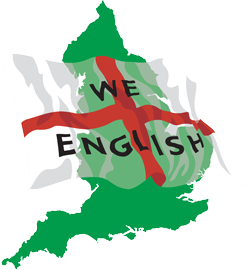Arthur Aughey reviews Real England: The Battle Against the Bland by Paul Kingsnorth over on Open Democracy.
“The bulk of Paul Kingsnorth’s book is a cry for his beloved country, an England becoming ever more inauthentic (I suppose this is the correct term) because of the relentless pursuit of growth. As the ‘globalised, placeless world spreads’ and ‘the spreading plastic of the consumer machine’ grinds with homogenizing force, the people of England are being turned into ‘citizens of nowhere’.
His book tracks the struggles of those ‘fighting the cause of the real England’ – from the struggle to keep up the traditions of ‘real ale’ in the ‘traditional English pub’ (and not in the traditional English pub, which like traditional fish and chips, can often mean a corporate simulacrum) to the fight to maintain the amazing variety of English apples against the drab uniformity of Fuji and Golden Delicious, neither of which are indigenous to the country.”
Read the whole review here.
Posted in MISCELLANEOUS | Comments Off on REAL ENGLAND, PAUL KINGSWORTH
I’ve just read Jeremy Paxman’s book The English: A Portrait of a People.
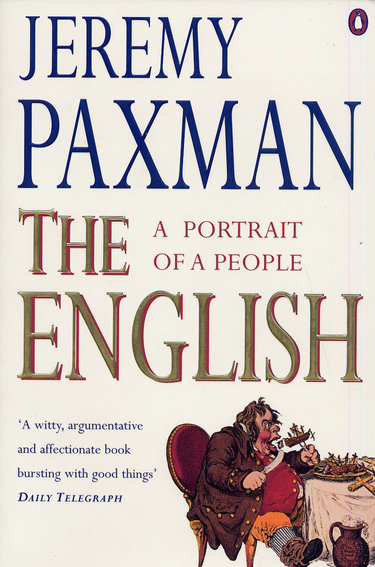
I particularly liked his assessment that while the French Revolution invented the Citizen, the English creation is the Game. Under the heading ‘The Ideal Englishman’ Paxman writes-
“Webb Ellis picked up the ball and ran with it during a game of soccer at Rugby School. Tennis was redeveloped by the Marylebone Cricket Club and the first of the world-famous Wimbledon tournaments was held in 1877. Englishmen set the standard distances for running, swimming and rowing competitions and developed the first modern horse-races. Contemporary hockey dates from the codification of rules by the Hockey Association in 1886, competitive swimming from the formation of the English Amateur Swimming Association in 1869, modern mountaineering can be dates from the 1854 attempt on the Wetterhorn by Sir Alfred Wills. The English invented goalposts, racing boats and stopwatches and were the first to breed modern racehorses. Even when they imported sports from abroad, like polo or skiing, the English laid down the rules. The first padded boxing glove was worn by the English prize-fighter Jack Broughton in the mid-eighteenth century, the Marquess of Queensbury codification of the rules of boxing followed over a century later. The list goes on.”
Posted in Uncategorized | Comments Off on THE GAME
 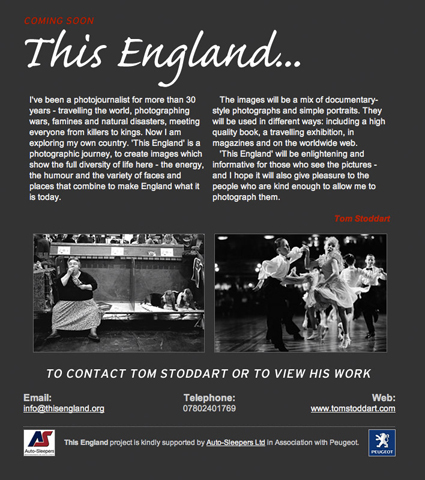
Well it looks like I’m in good company. One of my early influences and fellow British photographer, Tom Stoddart, is working on a series calledThis England which, in his own words, is “a photographic journey, to create images which show the full diversity of life here – the energy, the humour and the variety of faces and places that combine to make England what it is today. The images will be a mix of documentary-style photographs and simple portraits. They will be used in different ways: including a high quality book, a travelling exhibition, in magazines and on the worldwide web. ‘This England’ will be enlightening and informative for those who see the pictures – and I hope it will also give pleasure to the people who are kind enough to allow me to photograph them.”
I wish Tom well and look forward to passing him on the road this summer.
Posted in MISCELLANEOUS | Comments Off on THIS ENGLAND – TOM STODDART
This Bank Holiday weekend saw us head West from Brighton taking in West Wittering Beach, the Wickerman Festival at the Beltain Ancient Farm, Lawnmower Racing in Billingshurst and the Midhurst Carnival at Cowdray Ruins.
Here are a couple of images from our first few days on the road.Â
Day 1 – Base camp at Scotts Farm campsite in East Wittering
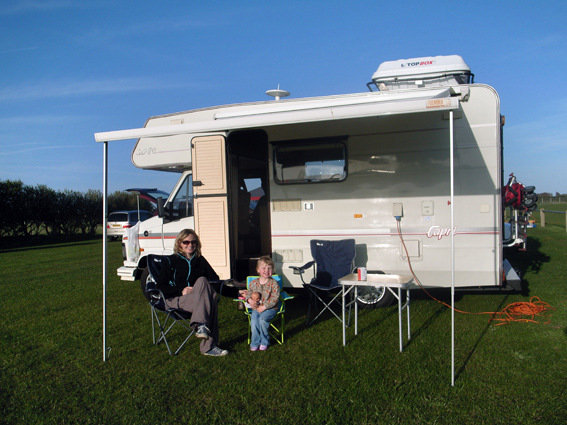
Day 2 – Â The Wickerman ready to burn at Beltane Ancient Farm
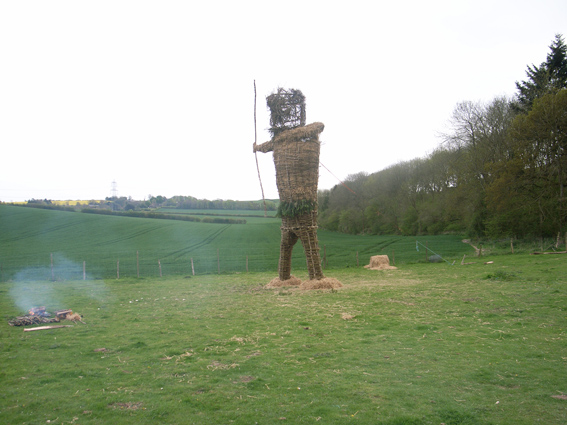
Day 3 – And grown men lawnmower racing in Billingshurst
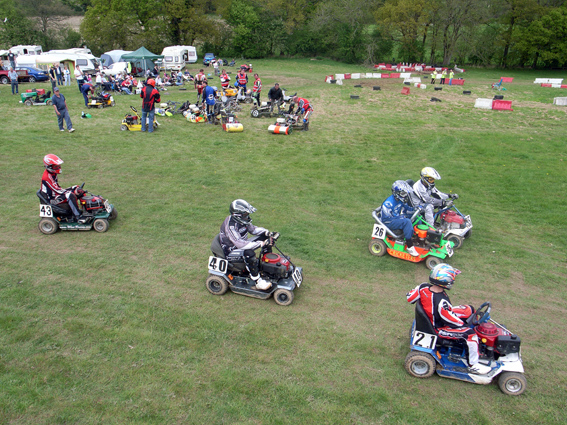
Posted in POSTCARDS | Comments Off on POSTCARDS FROM THE ROAD 1
I’ve long been fascinated by the tradition of the road trip in photography, partly thanks to the work of some of my early photographic influences notably Walker Evans, Robert Frank, Joel Sternfeld and of course Stephen Shore. All have employed extended journeys as an avenue for exploring America’s cultural landscape. Interestingly, Shore is just about to publish a new book with Phaidon aptly titled Stephen Shore: A Road Trip Journal
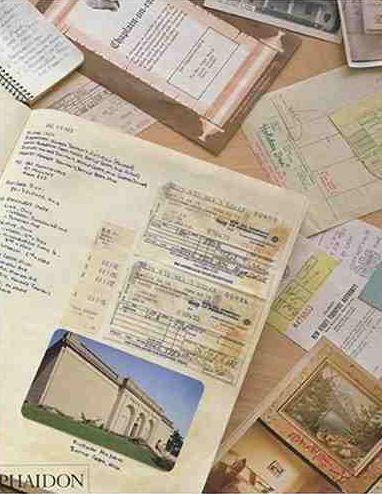
Similarly many writers and artists have also made extensive journeys to produce work, from H.V. Morton’s In Search of England and JB Priestley’s English Journey to Daniel Defoe’s Tour through the Whole Island of Great Britain and Patrick Keiller’s film Robinson in Space. In his diaries, J.M.W. Turner talks about extended summer trips around England, where he’d take time to visit his patrons and undertake new commissions. He worked in areas that attracted well-to-do summer tourists and their families, sketching scenes they might like to remember and admire again in watercolours.
Here’s an article from the New York Times in 2004 called Travels With Walker, Robert and Andy about the ”on the road” tradition in photography.
Posted in EASY RIDER | Comments Off on A ROAD TRIP
You can now listen to a podcast of my talk ‘rePresenting Russia’, which I delivered at the National Media Museum last week, online here. The talk was part of the Museum’s ‘Dramatic Reality: Photojournalism and Documentary Photography Today’ symposium day. You can hear all the talks and subscribe to the museum’s podcast here.
Posted in REVIEWS & PRESS | Comments Off on MOTHERLAND PODCAST
We’re off. A day later than planned, but when you’re also packing with a two-and-a-half year old in tow, things take a little longer. As with any new venture, we’re starting with a feeling of both elation and trepidation. But hey, if we can survive a year in Russia, then what’s a few months around England!
And somewhat surreally we’ve just been waved off by the Chanctonbury Ring Morris Men who turned up to perform on the street outside our local pub, The Eclipse.
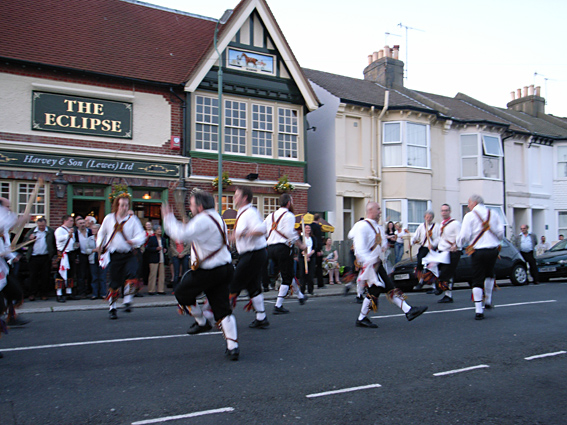
The Chanctonbury Ring Morris Men are an all-male side Cotswold and North West (clog) side based just to the north of Brighton. Named after the Chanctonbury Ring (a hill fort based ring of trees on top of the South Downs), they were formed in Shoreham in 1953 and elected to the Morris Ring in 1955.
Anyway, I hope you’ll join me on the blog to see how we get on this summer.
Posted in ON THE JOB | Comments Off on WE’RE OFF!
I’ve just come across an intriguing project called The Big Picture launched by the BBC and Arts Council which is asking participants to take a photograph which says “Englishness” to the viewer. It’s open to anyone living in the West Midlands. You’ll find more details on their website.
Posted in RESEARCH | Comments Off on THE BIG PICTURE
Happy May Day!
It was an early start this morning to photograph a jovial group of men known as The Long Man Morris Men who were performing (at 05.30am) at the feet of the 235ft-high Long Man of Wilmington. Although slightly reluctant to photograph this somewhat clichéd English pastime, I was soon won over as I stood on a deserted country road as the sun rose over the South Downs, watching twelve middle-aged men dance the Cotswold tradition.
Judge for yourself with this video posted on You Tube here.
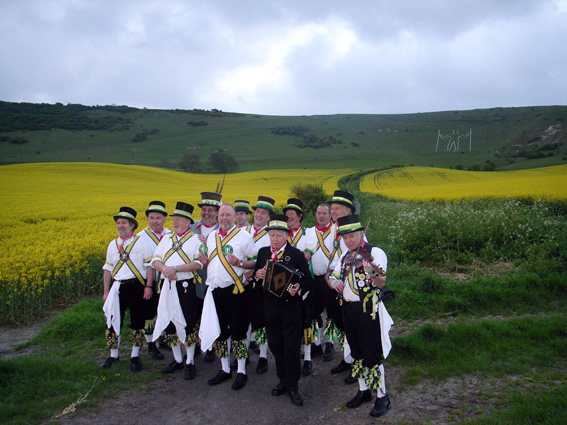
The Long Man Morris Men were founded in 1978 and today marked their 30th May Day performance at ‘The Long Man’.
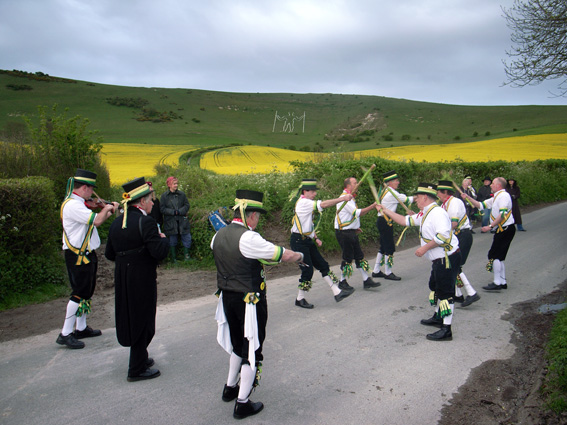
The Long Man of Wilmington towers above the village of Wilmington, nestling on the steep slopes of Windover Hill. The Sussex Archaeological Society have been responsible for The Long Man since 1925, when it was given to them by the Duke of Devonshire. Local legend has it the carving is an ancient fertility symbol who was robbed of his manhood by the prudish Victorians. Others believe it is the work of a monk from the nearby Michelham Priory, carved between the 11th and 15th Centuries. It may originally have been an indentation in the grass rather than a solid line, but archeologists say it was first outlined in brick in the mid-16th Century. The giant is so highly visible it had to be painted over during World War II to prevent enemy aircraft using it as a landmark.
To find out about May Day weekend events visit the England in Particular website.
Posted in EVENTS & PASTIMES | Comments Off on MAY DAY
I’ve just comes across this article by Amelia Hill in the Observer called The English identity crisis: who do you think you are? (Sunday 13 June 2004). It features some interesting quotes on the topic of Englishness-
The first quote is from Harold Roberts who considers himself to be one of England’s last true Englishmen. Now 74, he has been farming in the heart of land straddled by the Cotswolds and the Bredon and Malvern hills since he was eight years old.
“I don’t understand how anyone can feel English when they don’t have a connection with the English soil. The soil is my identity: it is as important to me as contact with living people. It is who I am, where I come from and, in the end, where I will go.”
Another quote comes from Paul Gilroy, London-born professor of Sociology and African American Studies at Yale University and author of There Ain’t No Black in the Union Jack.
“There is an anxiety about what it means to be English today that has reached a level of urgent intensity in the past five years,’ he says. ‘We are returning to a nativist interpretation of what England is, which can only lead to misery – both for incomers being bullied into adopting a version of Englishness, and for those born here, who are destined to be bitterly disappointed by eternally unmet, unrealistic expectations.”
Linda Colley, author of Captives: Britain, Empire and the World 1600-1850, argues that “Englishness is a new concept: a word that has only recently been invented. For any people to try to pin down their identity as though it is a captive butterfly is simply wrong: people are able to have more than one identity and the fact we’re returning to trying to limit ourselves to one identity is a sign of a growing insecurity and uncertainty.”
Colley believes that the recent search for Englishness is the reaction of a nation feeling squeezed out of existence by Europe on the one side, and by the devolution of power to Scotland, Wales and Northern Ireland on the other.
This is rebutted by Sir Bernard Crick, author of George Orwell: A Life and a book of political essays, Crossing Borders, who says “There is nothing to be ashamed of in trying to establish what it means to be English, any more than there is something to be ashamed of by defining what it is to be Scottish or Welsh. Englishness is something to be proud of and protected. A determination to discover what Englishness is, is a sign we are ready to become stronger as a nation. It was when we did not dare ask the question that we were weak.”
Professor Roger Scruton, philosopher and author, believes the English are facing one of the most dangerous moments in their history: “If people don’t have a social and an individual identity, they have no way of identifying with their neighbours or anyone else. That way lies social chaos, which is a potentially violent place to be.”
Sunder Katwala, general secretary of the Fabian Society, believes part of the problem is that, while Britishness has been defined and redefined over the generations, Englishness has remained untouched. “We knew what Britishness was, so it could be adopted, adapted and pluralised”, he says. ‘This is why we have British Asians but not English Asians. But far from being weakened by the lack of definition, the fact that we can’t define Englishness means we can still create it depending on what we want it to be. That very nebulousness has enabled the English to absorb new cultures and influences with fluid ease.”
Posted in ENGLISHNESS | 2 Comments »
